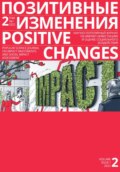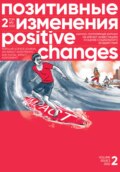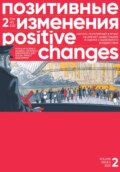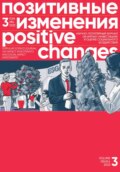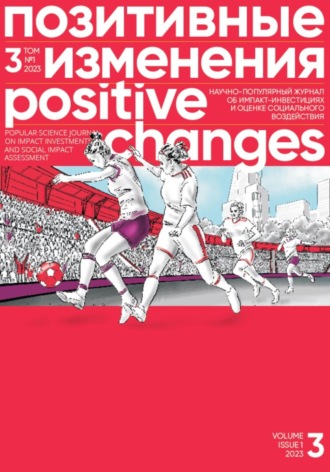
Редакция журнала «Позитивные изменения»
Позитивные изменения, Том 3 №1, 2023. Positive changes. Volume 3, Issue 1 (2023)
ВНЕШНЯЯ ОЦЕНКА ГРАНТОВОГО КОНКУРСА ФОНДА
Каждый год конкурс совершенствуется для того, чтобы быть максимально объективным, прозрачным, понятным и интересным для участников.
В сентябре 2018 года команда фонда приняла решение о необходимости внешней оценки, которая была проведена годом позже. Для оценки были привлечены два независимых эксперта. Отчет о результатах оценки был получен в ноябре 2019 г. На формирование ТЗ, постановку вопросов оценки и подбор оценщиков ушло 6 месяцев. Этот период стал самым продуктивным для сотрудников фонда в плане получения информации о его деятельности, анализа накопленных за годы данных, определения приоритетов, структуры и логики деятельности, стратегического развития и т. д.
При принятии решения о необходимости проведения оценки изначально речь не шла о грантовом конкурсе. Выбор в пользу него, а не реализуемых программ или проектов, подходов к управлению, мониторингу и оценке результатов, был сделан уже в период формирования ТЗ, после общения с потенциальными оценщиками, серии внутренних обсуждений, включая разговор с представителями донора.
Такое решение было принято, потому что конкурс позволяет фонду решать целый ряд задач. Например:
1) оценивать потребности различных целевых групп в решении социальных проблем;
2) выявлять уровень готовности/зрелости организаций, в том числе некоммерческого сектора, решать те или иные социальные проблемы, разрабатывать социальные проекты;
3) анализировать готовность этих организаций к партнерству и межведомственному взаимодействию;
4) выстраивать механизмы межведомственного взаимодействия, партнерства;
5) влиять на позиционирование компании и ее корпоративного фонда.
Таким образом, конкурс оказался важной процедурой, влияющей на программы, фонд, межведомственное взаимодействие, достижение целей программы «Дорога к дому» и стратегических целей фонда.
Вопросы оценки: в какой степени грантовый конкурс содействует повышению эффективности программы? В какой степени положение о конкурсе, формат заявки проекта на конкурс и система экспертной оценки заявок позволяют оценить эффективность проекта, адекватность заявленных затрат? Какие изменения следует внести в положение о грантовом конкурсе, в заявку и систему оценки проектов?
Если попробовать выстроить условный рейтинг полезности этапов оценки, т. е. информационной практической насыщенности для развития, то в нашем случае это:
1) Формирование ТЗ, выбор оценщиков.
2) Процесс оценки; общение с оценщиками; обратная связь от участников оценки.
3) Обсуждение, внедрение результатов, рекомендаций.
4) Отчет об оценке.
В результате оценки команда фонда получила отчет со списком предложений и рекомендаций по развитию грантового конкурса, также в процессе оценки сформировался образ изменений, которые необходимо внедрить.
Цитаты экспертов из отчета об оценке:
• «Конкурсный механизм понятен и хорошо себя зарекомендовал. Формат открытого конкурса удобен и его необходимо сохранить как одну из форм отбора проектов для финансирования. Календарный график конкурсов также удобен».
• «По оценкам участников интервью уровень влияния деятельности фонда на позитивные социальные изменения в положении благополучателей и решение социальных проблем города (в зоне приоритетных направлений) оценивается в 40 %. Это очень высокий показатель».
• «Поддержанный проект, после нескольких лет успешной работы может получить статус «службы» фонда. Отработана методология, выстроены алгоритмы, налажено межведомственное взаимодействие».
ТРАНСФОРМАЦИЯ ДЕЯТЕЛЬНОСТИ
В 2019–2020 гг. по итогам оценки состоялась масштабная трансформация всех конкурсных процедур. Ключевые изменения в конкурсе:
1. Конкурс стал конкурсом фонда, а не его отдельной программы «Дорога к дому». Фонд реализует две целевые программы, но его деятельность шире, чем обе программы. В связи с чем добавилась такая целевая группа, как специалисты сферы детства, и на конкурс стали приниматься проекты, направленные на работу по предупреждению кризисных ситуаций (медиапроекты, проекты по формированию общественного мнения, навыков безопасного поведения).
2. Расширена география конкурса, во-первых, на соседние с Череповцом районы Вологодской области, потому что их жители зачастую работают в Череповце, а дети посещают образовательные учреждения города. Во-вторых, на второй большой город – областной центр (г. Вологду). В-третьих, на город присутствия компании «Свеза» (также поддерживает программу «Дорога к дому») Великий Устюг в Вологодской области. В-четвертых, на пос. Яковлево в Белгородской области.
3. Начался целенаправленный сбор обратной связи от заявителей и экспертов, чтобы своевременно вносить необходимые изменения в конкурсные процедуры. По результатам проводятся консультации и встречи с заявителями, чьи проекты не получили финансирование конкурса. Непрошедшие заявки могут быть доработаны совместно со специалистами ресурсно-методического центра фонда и поданы на конкурсы грантов других грантодающих организаций.
4. Внедрен принцип вариативности конкурсных механизмов: проекты могут быть отобраны через открытый конкурс, могут быть инициированы сотрудниками фонда после анализа проблем и существующей на территории ситуации, специалисты могут принимать участие в партнерских проектах.
5. Запущен сайт конкурса https://socialprojects.dorogakdomu.ru/. Заявки принимаются только через личный кабинет заявителя, для экспертизы заявок также введен функционал личного кабинета эксперта.
6. Формирование доказательной базы проекта начинается на этапе подготовки грантовой заявки (в заявку добавлены новые разделы).
7. В фонде определен функционал по сопровождению конкурса (администраторы, тематические консультанты, программисты).
8. Апробирована и утверждена трехуровневая система оценки грантовых заявок.
9. К оценке привлечены независимые эксперты, что позволило исключить конфликт интересов заявитель-эксперт.
10. Введен новый орган – конкурсный совет.
Таким образом, проведенная оценка позволила существенно повысить уровень зрелости конкурса, что повлияло и на другие процессы фонда: механизмы межведомственного взаимодействия, позиционирования фонда, планирования деятельности, управления проектами (см. Таблица 1).
Таблица 1. Непосредственные результаты грантового конкурса фонда после внедрения результатов независимой оценки конкурса

ВНУТРЕННЯЯ ОЦЕНКА И САМООЦЕНКА КОНКУРСА
Эти виды оценки проводятся ежегодно с соблюдением принципа триангуляции по источнику данных. То есть информация о конкурсе собирается не менее чем из трех источников данных, с целью независимого подтверждения результатов и возможности рассмотреть доказательства достижения социального результата под разными углами зрения.
1. Ежегодно (с 2008 года) проводятся предконкурсные и постконкурсные обсуждения с командой организаторов конкурса. В фокусе анализа следующие вопросы: направления и целевые группы конкурса, география, вклад проектов грантополучателей в достижение стратегических целей фонда.
2. С 2020 года ежегодно собирается обратная связь от заявителей и членов конкурсной комиссии. Метод сбора данных – сплошной опрос. Инструмент – онлайн-анкета. В 2021 году в опросе приняли участие 66 % заявителей и 81 % членов конкурсной комиссии. Из отчета 2021 года по результатам анализа обратной связи заявителей и экспертов конкурса:
• «Для удобства заявителей и экспертов в 2020 году были разработаны справочные материалы: руководство для экспертов и руководство для заявителей. Практически все заявители и эксперты, за исключением 7 % и 5 % соответственно, воспользовались предложенным руководством. Все они отметили, что справочный материал оказался полезным при работе на сайте конкурса».
• «60 % заявителей в период подготовки заявки получали консультации специалистов фонда по телефону или электронной почте. Коммуникации со специалистами были высоко оценены заявителями и экспертами конкурса. Комментируя свою оценку, эксперты и заявители отмечают, что консультации были получены оперативно, специалисты смогли ответить на все интересующие вопросы. Заявители, которые не обращались за консультацией, отмечают, что смогли самостоятельно заполнить заявку, благодаря подробным инструкциям в руководстве для заявителей. Эксперты поблагодарили всю команду конкурса за быструю обратную связь, внимательность и доброжелательность».
3. С 2019 года к обсуждению конкурсных процедур привлекается профессиональное сообщество (оценщики, специалисты грантодающих организаций, участники конференций по оценке Ассоциации специалистов по оценке программ и политик).
ОСОБЕННОСТИ ГРАНТОВОГО КОНКУРСА
1. БФ «Дорога к дому» на регулярной основе проводит социологические и оценочные исследования по актуальным темам. Результаты исследований публикуются на официальном сайте организации и обсуждаются в профессиональных кругах[51]. Благодаря этому потенциальные заявители могут не проводить предпроектную оценку самостоятельно, не искать проблемную ситуацию и уязвимую социальную группу. Эти данные заявители могут получить из результатов исследований.
Информация о конкурсе собирается не менее чем из трех источников данных, с целью независимого подтверждения результатов и возможности рассмотреть доказательства достижения социального результата под разными углами зрения.
2. Сопровождаемая реализация проектов-победителей конкурса. В течение всего периода реализации осуществляется сопровождение, оказываются различные виды поддержки грантополучателям: информационное сопровождение (продвижение, информирование, повышение медиаэффективности проекта); помощь добровольцев; методическая помощь.
3. Внедрение доказательного подхода на стадии подготовки заявки[52].
4. Конкурс развивался в Череповце. Череповец – средний по численности населения промышленный город России, который несколько десятилетий носил статус моногорода, с градообразующим предприятием компании «Северсталь». Фонд первым в городе начал проводить конкурс проектов для получения финансирования. Те, кто получали гранты, одновременно получали доступ к обучению, собственным методическим материалам, экспертной поддержке, профессиональному сообществу, разработке и апробации новых технологий работы с детьми и семьями. Одним из условий реализации проектов является межведомственное взаимодействие: партнерство со специалистами социальной сферы, сферы здравоохранения, образования, правоохранительных органов, высшей школы, представителями местной власти, бизнеса, СМИ. В результате чего в городе сформировался пул специалистов и партнеров сферы проблемного детства, которые владели современными технологиями социальной работы, разделяли ценности фонда, применяли в работе проектный подход, внедряли инструменты оценки и мониторинга. Кадровый ресурс небольшого Череповца ограничен, в связи с чем этот пул специалистов и партнеров принимал участие в деятельности фонда в разных ролях. До 2019 года порой один и тот же человек мог подтверждать/ опровергать актуальность проблем, заявленных в проектах фонда, инициировать и реализовывать проекты фонда, оценивать заявки и результаты проектов. Внедрение результатов оценки позволило выстроить объективную понятную процедуру отбора проектов, сохранив включенных и заинтересованных специалистов. Таким образом сегодня у каждой привлеченной к конкурсу группы специалистов своя роль. Мы ввели две новые группы специалистов: независимых экспертов и представителей главного донора.
С 2019 года:
• специалисты и представители власти на этапе разработки проекта, подготовки заявки могут подтверждать или опровергать актуальность проблем, заявлять об острых ситуациях, требующих решения средствами/ресурсами фонда. Ранее они же оценивали заявки, поступившие на конкурс;
• к оценке проектов привлекаются только внешние эксперты по отношению к деятельности фонда и территориям (эксперты в социальном проектировании и по тематике направлений деятельности фонда). Ранее внешние эксперты (конкурсная комиссия) не привлекались к конкурсным процедурам;
• в 2019 году впервые создан конкурсный совет, куда входят представители донора, городской власти и фонда. Совет принимает окончательное решение о победителях конкурса.
В планах фонда – повышение уровня зрелости конкурсных процедур, что включает:
• создание полифункционального личного кабинета грантополучателя (функции промежуточной и итоговой отчетности, мониторинга проектов);
• продолжение внедрения доказательного подхода к социальному проектированию для грантополучателей (усиление логической связанности проектов, формирование доказательной базы проекта, регламентирование процедур работы со специалистами – членами проектных команд).
СОВЕТЫ И РЕКОМЕНДАЦИИ
Исходя из опыта фонда «Дорога к дому», составлен список рекомендаций, которые помогут улучшить подобные конкурсы. Эти советы могут быть полезны в работе грантодающих организаций.
1. Времени для всех этапов конкурса должно быть достаточно: и период приема заявок, и период экспертизы, и период публикации результатов. Лучше заранее объявить победителей, чем переносить сроки объявления.
2. Регламентировать все конкурсные процедуры[53]: положение о конкурсе, положение о конкурсной комиссии и конкурсном совете, карточки экспертов и заявителей, подробные актуальные методические рекомендации для экспертов и заявителей, инструкции по работе на платформе конкурса, согласия на обработку персональных данных, примеры заполнения различных разделов заявки (в том числе бюджета проекта).
3. Проводить целенаправленную работу с будущими и настоящими заявителями: семинары и консультации по широкому спектру вопросов разработки, реализации, управления, мониторинга, оценки, завершения проектов; аудит заявок-победителей и заявок, не получивших гранты; дни открытых дверей грантодающей организации и проектов-победителей.
4. Повышать прозрачность конкурсных процедур: предварительное планирование информационной кампании по продвижению конкурса и его результатов, мероприятия для вовлечения грантополучателей (как минимум за 3 месяца до старта приема заявок или на постоянной основе, если грантовый конкурс проводится регулярно), информирование о том, какие проекты ожидает грантополучатель от заявителей.
5. Проводить мониторинг/оценку вклада грантового конкурса в достижение стратегических задач грантодателя.
How the Best Social Projects Grant Competition 2022 Works. The Road Home Foundation’s Case
Alena Bogomolova
DOI 10.55140/2782–5817–2023–3–1–66–79

In 2022, the Road Home Charitable Foundation’s grant competition was recognized as the best program that promotes sustainable development through competitive mechanisms. It won the Donors Forum’s Leaders in Corporate Philanthropy project. Twelve applications were competing in the Best Grant Competition category. In this article, we want to show you how the social projects contest takes place, and what helped it gain the recognition in the professional community.

Alena Bogomolova
Head of the Resource and Methodology Center of the Road Home Charitable Foundation, member of the Management Board of Association of Program and Policy Evaluators
FROM A ONE-OFF PROJECT TO SYSTEMIC ASSISTANCE
The Road Home Charitable Foundation was founded in 2005 as a CSR fund of Severstal, a company based in Cherepovets, Vologda Region. It started work with a single project promoting family placement of orphans and children left without parental care. Gradually, the Foundation expanded its range of activities, including projects preventing newborn abandonment, working with troubled teens and families at risk, where parents can be restricted or deprived of parental rights for reasons of family dysfunction.
On February 18, 2023, The Road Home Foundation celebrated its 18th anniversary. Over the years, the organization has completed dozens of projects, helping 15–20 thousand people annually receive specialist help. The number of children abandoned in Cherepovets has decreased 7-fold; about 200 babies have remained in their birth families; the number of families in a socially dangerous situation in the Vologda Region has decreased 3-fold in the past four years, and the teenage crime rate has decreased 2.4-fold. Today, the Foundation is the largest non-profit organization in the Vologda Region and a resource center for NGO specialists from all over Russia.
The Foundation is engaged in the development of systemic philanthropy. The aim of its work is to effectively address social problems faced by families with children. The organization conducts applied research, to discover what issues such families are most concerned about and to identify the key areas of focus. A further goal is to support best practices, tools, and technologies for helping families and children. To this end, the Foundation holds a grant competition for social projects. Non-profit organizations and social institutions are eligible to participate. Project ideas are evaluated by independent experts. The key criteria are: no overlap with the current activities of the applicant organization, achievable goals and objectives, relevance to the target group and the community, and a logical coherence of the projects.
The social projects competition has become a tool for improving the quality of life in areas. Severstal considers its funding to be a social investment and a contribution to the UN Sustainable Development Goals: SDG 3: Good Health and Well-Being, SDG 10: Reducing Inequality, SDG 4: Quality Education, SDG 17: Partnerships for Sustainable Development, etc.
The contest promotes the goals of the company’s sustainable development strategy[54] and corporate charity, as well as the state policy in the field of family, motherhood and childhood.
TERRITORIAL COVERAGE
From 2008 to 2011, the grant competition was held in Cherepovets. Today the geographical coverage of the competition corresponds to the territories of Severstal’s operation.
In 2012, the following cities were included for the first time:
• Vorkuta (Komi Republic);
• Veliky Ustyug (Vologda Region);
• Balakovo (Saratov Region);
• Kostomuksha (Republic of Karelia).
In 2022, the geography of the contest was further expanded to the following territories:
• Cherepovets and/or Cherepovets District (Vologda Region);
• Vologda and/or Vologda district (Vologda Region);
• Totma and/or Totemsky District (Vologda Region);
• Sheksna village and/or Sheksninsky district (Vologda Region);
• Veliky Ustyug (Vologda Region);
• Krasavino (Vologda Region);
• Olenegorsk (Murmansk Region);
• Stroitel (Yakovlevsky district, Belgorod Region).
GOALS AND OBJECTIVES
The goal of the contest is to identify and support local initiatives that address the urgent social problems faced by families and children and offer solutions consistent with the activities of the Foundation.
Objectives of the grant competition:
• Identifying active specialists, setting up and developing partner communications in the field of childhood.
• Improving the competencies of social design, project management and project evaluation specialists.
• Developing technologies to improve the well-being of children, families with children, and specialists in the field of childhood.
RELEVANCE OF THE GRANT COMPETITION
Different stakeholders find the contest relevant for different reasons. For example, winning the competition is a growth driver for the grantee organizations, as well as for the overall development of the culture of philanthropy, evaluation and involvement of service recipients in management processes.
Specialists involved in the projects get new opportunities for self-realization, career growth, development of competencies and network of professional contacts. Winning projects enable them to test hypotheses and practice innovative social mechanisms.
The significance of the contest for The Road Home Foundation grows each year.
The contest has a serious impact on the non-profit sector in the regions where the company operates. First, the winners find new ways to address pressing social problems, thereby adding to the Foundation’s portfolio of practices. Second, participating in the competition requires embracing the Foundation’s principles and values, which promotes evaluation, evidence-based approach, subject-to-subject approach, and a culture of philanthropy in the social sphere. Third, participating in the project implementation creates a unified approach and allows professionals to act in concert in providing assistance to beneficiaries (primarily families with children). Fourth, the competition program helps build the proper image of the Foundation and the company, raising the awareness among key stakeholders.
The Foundation conducts applied research, to discover what issues such families are most concerned about and to identify the key areas of focus and supports best practices for helping families and children.
The stakeholders of the competition are:
• The donor (Severstal): allocates funds for organizing and conducting the contest and implementing the winning projects; a company representative is a member of the jury for the contest. High influence.
• The Foundation team: organizes and conducts the contest; supports the winning projects. High influence.
• Winning project teams: develop and implement projects. Low influence.
• Beneficiaries: participate directly in the projects, evaluate the projects. Medium influence.
• Partner organizations: support the implementation of winning projects, provide human and material resources. Medium influence.
WHO MAKES THE ROAD HOME FOUNDATION GRANT COMPETITION
The competition team can be divided into three groups, each participant having a different role and function.
1. Administrative team:
• the director of the Foundation is the decision-maker;
• the deputy director of the Foundation organizes expert review of the applications;
• the head of the resource and methodological center of the Foundation manages the competition, consults all participants;
• the head of the media department of the Foundation provides information support;
• the economist and methodologists of the Foundation provide consultations on drafting the budget and applications.
The winners find new ways to address pressing social problems, thereby adding to the Foundation’s portfolio of practices. Participating in the competition requires embracing the Foundation’s principles and values, which promotes evaluation, evidence-based approach.
2. Joint implementing team:
• the competition committee – in-house and third-party experts in the Foundation’s areas of activity, experts in the field of social design, applied and evaluative research, following evidence-based approach in evaluating the results of social practices;
• the competition council – a collective body created specifically to make the final decision determining the competition winners;
• programmers – maintenance of the contest website[55].
3. Partners:
• media in the territories covered by the competition – information coverage of the competition and its results;
• city administrations and specialized departments in the contest territories – engaging grantees, developing a pool of urgent problems that require project ideas, and providing partner support to the winning projects;
• NGO resource centers in the contest territories – engaging grantees, assisting in executing applications and implementing the winning projects.
WHO EVALUATES APPLICATIONS AND HOW
The projects eligible for the competition last from 6 to 36 months. Regardless of the topic, duration, amount of funding, territory of implementation and size of the project team, each winning project must produce measurable positive change for the stated target groups. This is the key condition for obtaining funding.
The competition committee evaluates all applications received by the following criteria:
1. The project’s compliance with the goals and conditions of the competition.
2. The project’s relevance and significance for solving the problems of the target group.
3. Feasibility, logical coherence and the ability of the planned actions to achieve a progress towards the project goal.
4. Specific and achievable results planned.
5. Replicability of the project (the possibility of applying the technologies of the project in other organizations, in other territories).
6. The ability of the project team to achieve the project goal.
7. Feasibility of the project budget and alignment of the planned costs with the expected results.
SOCIAL RESULTS OF THE ROAD HOME FOUNDATION’S GRANT COMPETITION
Implementing the projects supported by the Foundation helps improve the quality of life for the project beneficiaries (children, families with children, and child welfare specialists) and increases the number of organizations and specialists providing quality services to beneficiaries. Project specialists help create safe living and developmentally favorable conditions for children in families, to form or strengthen positive personal and socially significant changes in minors, to improve the socio-psychological and parental competences in child-rearing and building harmonious parent-child relationships, and to improve the professionalism of child welfare specialists.
In 2022, more than 1,700 people received assistance from the winning projects; in 2021, the number of beneficiaries was 3,800; and in 2020 – more than 1,700 people.
EFFECTS OF THE GRANT COMPETITION ON THE IMAGE OF THE ROAD HOME CHARITY FOUNDATION
Regular grant competitions help raise awareness about, The Road Home, within the professional community, while also building the Foundation’s expertise, including invitations to share experience and implement partnership projects.
As it follows from the report “Assessment of Interaction with the Key Stakeholders of The Road Home Charitable Foundation’s programs in 2021”, “eight out of ten partners of the Charity Foundation, the Foundation’s specialists and program specialists say that they are well informed about the activities of the Foundation, are engaged in these activities (the foundation has a total of 18 employees, with more than 250 specialists implementing projects in the 7 regions covered by its programs. The sentence above refers to these specialists, who are not directly employed by the Foundation – ed.) 97 % of the Foundation’s partners approve of its activities. More than 80 % of the partners say that since they began working with the Foundation’s program specialists, there have been positive changes in the partners’ work (institutions and other NGOs working with families and children), and the Foundation’s specialists are providing them with exactly the help they need.
EXTERNAL EVALUATION OF THE FOUNDATION’S GRANT COMPETITION
The contest is improved every year, so as to make it as objective, transparent, understandable and interesting for the participants as possible.
In September 2018, the Foundation’s team decided that an external evaluation was needed, which was conducted a year later. Two independent experts were engaged in the evaluation. The evaluation report was received in November 2019. It took 6 months to generate the scope of work, set up the questions for the evaluation and select the specialists. This period was the most productive for the Foundation’s staff in terms of obtaining information about its activities, analyzing the data accumulated over the years, determining the priorities, structure and logic of the activities, strategic development objectives, etc.
The decision to conduct the evaluation was not originally related to the grant competition. The choice to evaluate the competition rather than the programs/projects being implemented, approaches to management, monitoring and evaluation of results was made during the development of the scope of work, after communication with prospective evaluators and a series of internal discussions, including a conversation with the donor’s representatives.
The decision was made because the competition allowed the Foundation to address multiple problems. For example:
1) evaluate the needs and social problems faced by different target groups;
2) identify the readiness/maturity of various organizations, including in the non-profit sector, to address social problems and to develop social projects;
3) analyze these organizations’ readiness to establish partnership and interdepartmental interaction;
4) build mechanisms for interdepartmental interaction and partnership;
5) affect the positioning of the company and its CSR fund.
Thus, the competition has proven to be an important procedure affecting programs, the Foundation itself, inter-departmental collaboration, and the progress towards the strategic goals of The Road Home Program and the Foundation.
The following questions were asked during the evaluation: To what extent does the grant competition contribute to the program effectiveness? To what extent do the competition regulations, the format of the applications and the expert review system of applications allow you to evaluate the effectiveness of the project and the adequacy of the declared costs? What changes should be made to the grant competition regulations, application, and the project evaluation system?
Trying to build a tentative ranking of the usefulness of various stages of assessment, that is, the saturation with practical information for development, we arrive at the following:
1) Preparing the scope of work, choosing evaluators.
2) Evaluation process; communication with evaluators; feedback from evaluation participants.
3) Discussion, implementation of results, recommendations.
4) Evaluation report.
As a result of the evaluation, the Foundation team received a report with a list of suggestions and recommendations for further development of the grant competition, and the evaluation process created an image of the changes that need to be implemented.
Expert quotes from the evaluation report:
• “The mechanism of the competition is clear and well-established. The open competition format is convenient and should be retained as a form of selecting projects for funding. The calendar schedule of the competitions is also convenient.”
• “According to the interviewees’ opinions, the influence of the Foundation’s activities on positive social changes in the beneficiaries’ situation and on solving the city’s social problems (within the priority areas of operation) is estimated at 40 %. This score is very high.



